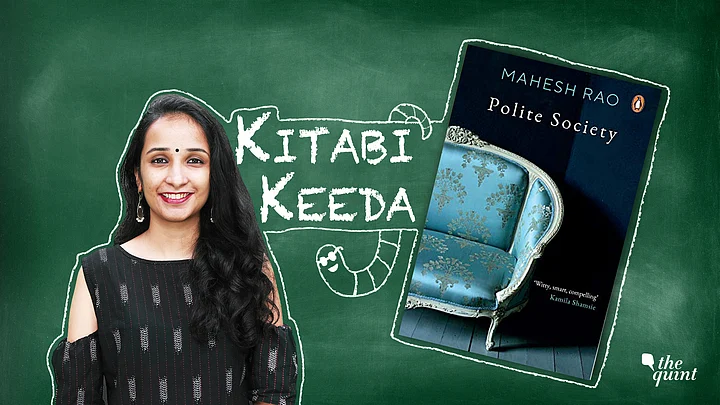Keeda’s Quick Takes
- What? An insightful read into the frivolity and the futility of the lives of crazy rich Dilliwallahs.
- For Whom? Anyone who has lived in Delhi. is curious about the city & wants to know how uber-rich people live. Also, Jane Austen fans.
Silk is a funny fabric. It’s the ultimate symbol of luxury. A fabric which tells you that its wearer is not only rich but is also someone who understands taste. It’s also incredibly fragile. A little pull, and the fabric falls apart. It’s a little like the upper-class Delhi society portrayed in Mahesh Rao’s Polite Society – an adaptation of Jane Austen’s Emma.
Filled with South Delhi aunties (the likes of whom are parodied with delight on the Internet), spoilt young women with as many hobbies as fancy vacations, ridiculously rich families with their extravagant parties and perennial outsiders gazing at a privileged and almost impenetrable shiny world– Polite Society is an insightful read into the frivolity and the futility of the lives of crazy rich Dilliwallahs.
Too caught up to read the story? Listen to it instead!
A South Delhi Girl and A Heroine to Root For
“Yaar, if I had all the money in the world na…” is a conversation we’ve all had with our friends, imagining what life would be like if we were rich; the kind of rich where we would have front-row seats in the Paris Fashion Week and never have to hold down a job in our life. Well, Ania Khurana has that life.
When not playing matchmaker, she is writing a novel – ostensibly. Belonging to the Khurana family, she shudders at the thought of a picnic in Lodhi Gardens and considers herself a resident of Prithviraj Road, and not Delhi. But despite having the world at her feet, she struggles – with things not working out as she wanted them to, with figuring out the purpose of her charmed life, but mostly with the fickle nature of people.
Every Emma adaptation must figure out how to add depth to, what is essentially, a shallow and spoilt heroine.
In ‘Clueless’, Cher (played by Alicia Silversatone)’s heartbreak was apparent when her friends desert her. But in ‘Aisha’, Sonam Kapoor’s titular character was largely one-dimensional; it was hard to sympathise with her when her tears were surrounded by Louis Vitton bags.
With Ania Khurana, Mahesh Rao acquits himself honourably. When Ania suffers an unpleasant incident (avoiding spoilers!) in an Italian villa, we don’t get distracted by the privilege of her life. A well-rounded Ania Khurana ensures that the world Rao reveals for us seems real and not just a parody. We see its superficiality and failings clearly, but more importantly, with empathy.
A Snarky & Sharp Critique of ‘Bade Log’
In Karan Johar’s ‘Kabhie Khushi Kabhie Gham’, Anjali (played by Kajol) has a great line which encapsulates how most Indians feel about rich people – “vadde log, vaddi vaddi baatein”, which roughly translates to 'rich people and their foibles’.
Underneath the twinkle of a Longines watch, lies the grime and helplessness of people holding onto their position in a harsh and unforgiving Delhi society. The Nouveau rich and their extravagance are termed as vulgar and the real gods in Rao’s book are those who’ve always been rich – and somehow, managed to hold on to it.
But with generational wealth, comes insecurity, jealousy and worst of all, a fear of becoming irrelevant. When your entire existence is a circle of vicious validation based on how wealthy you are, how do you stop time? Money decreases over time, as any economics student will tell you, so what do you do?
Rao is irreverent about the upper-class in Delhi, even as he peels back the layers which makes them untouchable to the rest of us middle-class mortals. And his snark is best exemplified in two characters – Fahim, the perennial outsider and Nina Varkey, the socialite who finds herself thrown out of the world she has ruled over for years. In one of the first instances when we meet Nina, this is how Rao describes her,
‘Oh, these days,’ she said, ‘the only way you can tell the difference between these loud women in the cafes and their maids is by the quality of the diamonds in their ears.’Polite Society, Mahesh Rao
Nina’s insistence that she is truly deserving of a place in “polite society” of the upper echelons of Delhi is the only heritage she can lay claim to; the only thing which can differentiate her from the rest. And so, her subsequent fall – in her tumultuous personal life and in her finances – is heartbreakingly tragic.
Fahim, on the other hand, desperately wants to belong to a world which has no use for him. A talented journalist by profession, he’s bitter about how in power-obsessed Delhi, access is everything. He wants to be like the Khuranas of the world, gilding with ease anywhere, just by the virtue of who they are. But the betrayal he suffers, is the ultimate indictment of upper-class society.
Because being talented, rich or charismatic doesn’t guarantee you a place in the much-coveted and hollow hallways of polite society.
You just have to be born with it, baby.
(Kitaabi Keeda is a fortnightly column where we review books for the reader who wants to get back to reading but only has a weekend — or maybe some hours in a day — to spare. Reading is for everyone, and we’re just about to tell you how.)
(At The Quint, we question everything. Play an active role in shaping our journalism by becoming a member today.)
